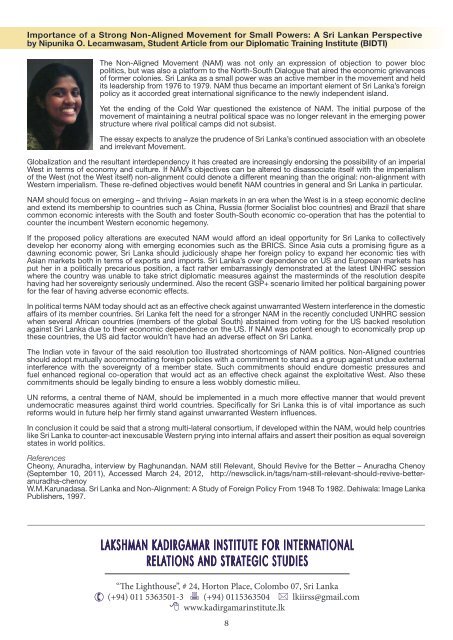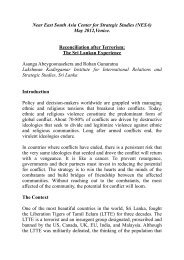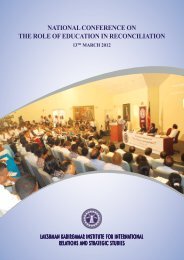Kadirgamar Quarterly - Lakshman Kadirgamar Institute of ...
Kadirgamar Quarterly - Lakshman Kadirgamar Institute of ...
Kadirgamar Quarterly - Lakshman Kadirgamar Institute of ...
You also want an ePaper? Increase the reach of your titles
YUMPU automatically turns print PDFs into web optimized ePapers that Google loves.
Importance <strong>of</strong> a Strong Non-Aligned Movement for Small Powers: A Sri Lankan Perspective<br />
by Nipunika O. Lecamwasam, Student Article from our Diplomatic Training <strong>Institute</strong> (BIDTI)<br />
The Non-Aligned Movement (NAM) was not only an expression <strong>of</strong> objection to power bloc<br />
politics, but was also a platform to the North-South Dialogue that aired the economic grievances<br />
<strong>of</strong> former colonies. Sri Lanka as a small power was an active member in the movement and held<br />
its leadership from 1976 to 1979. NAM thus became an important element <strong>of</strong> Sri Lanka’s foreign<br />
policy as it accorded great international significance to the newly independent island.<br />
Yet the ending <strong>of</strong> the Cold War questioned the existence <strong>of</strong> NAM. The initial purpose <strong>of</strong> the<br />
movement <strong>of</strong> maintaining a neutral political space was no longer relevant in the emerging power<br />
structure where rival political camps did not subsist.<br />
The essay expects to analyze the prudence <strong>of</strong> Sri Lanka’s continued association with an obsolete<br />
and irrelevant Movement.<br />
Globalization and the resultant interdependency it has created are increasingly endorsing the possibility <strong>of</strong> an imperial<br />
West in terms <strong>of</strong> economy and culture. If NAM’s objectives can be altered to disassociate itself with the imperialism<br />
<strong>of</strong> the West (not the West itself) non-alignment could denote a different meaning than the original: non-alignment with<br />
Western imperialism. These re-defined objectives would benefit NAM countries in general and Sri Lanka in particular.<br />
NAM should focus on emerging – and thriving – Asian markets in an era when the West is in a steep economic decline<br />
and extend its membership to countries such as China, Russia (former Socialist bloc countries) and Brazil that share<br />
common economic interests with the South and foster South-South economic co-operation that has the potential to<br />
counter the incumbent Western economic hegemony.<br />
If the proposed policy alterations are executed NAM would afford an ideal opportunity for Sri Lanka to collectively<br />
develop her economy along with emerging economies such as the BRICS. Since Asia cuts a promising figure as a<br />
dawning economic power, Sri Lanka should judiciously shape her foreign policy to expand her economic ties with<br />
Asian markets both in terms <strong>of</strong> exports and imports. Sri Lanka’s over dependence on US and European markets has<br />
put her in a politically precarious position, a fact rather embarrassingly demonstrated at the latest UNHRC session<br />
where the country was unable to take strict diplomatic measures against the masterminds <strong>of</strong> the resolution despite<br />
having had her sovereignty seriously undermined. Also the recent GSP+ scenario limited her political bargaining power<br />
for the fear <strong>of</strong> having adverse economic effects.<br />
In political terms NAM today should act as an effective check against unwarranted Western interference in the domestic<br />
affairs <strong>of</strong> its member countries. Sri Lanka felt the need for a stronger NAM in the recently concluded UNHRC session<br />
when several African countries (members <strong>of</strong> the global South) abstained from voting for the US backed resolution<br />
against Sri Lanka due to their economic dependence on the US. If NAM was potent enough to economically prop up<br />
these countries, the US aid factor wouldn’t have had an adverse effect on Sri Lanka.<br />
The Indian vote in favour <strong>of</strong> the said resolution too illustrated shortcomings <strong>of</strong> NAM politics. Non-Aligned countries<br />
should adopt mutually accommodating foreign policies with a commitment to stand as a group against undue external<br />
interference with the sovereignty <strong>of</strong> a member state. Such commitments should endure domestic pressures and<br />
fuel enhanced regional co-operation that would act as an effective check against the exploitative West. Also these<br />
commitments should be legally binding to ensure a less wobbly domestic milieu.<br />
UN reforms, a central theme <strong>of</strong> NAM, should be implemented in a much more effective manner that would prevent<br />
undemocratic measures against third world countries. Specifically for Sri Lanka this is <strong>of</strong> vital importance as such<br />
reforms would in future help her firmly stand against unwarranted Western influences.<br />
In conclusion it could be said that a strong multi-lateral consortium, if developed within the NAM, would help countries<br />
like Sri Lanka to counter-act inexcusable Western prying into internal affairs and assert their position as equal sovereign<br />
states in world politics.<br />
References<br />
Cheony, Anuradha, interview by Raghunandan. NAM still Relevant, Should Revive for the Better – Anuradha Chenoy<br />
(September 10, 2011), Accessed March 24, 2012, http://newsclick.in/tags/nam-still-relevant-should-revive-betteranuradha-chenoy<br />
W.M.Karunadasa. Sri Lanka and Non-Alignment: A Study <strong>of</strong> Foreign Policy From 1948 To 1982. Dehiwala: Image Lanka<br />
Publishers, 1997.<br />
LAKSHMAN KADIRGAMAR INSTITUTE FOR INTERNATIONAL<br />
RELATIONS AND STRATEGIC STUDIES<br />
“The Lighthouse”, # 24, Horton Place, Colombo 07, Sri Lanka<br />
(+94) 011 5363501-3 6 (+94) 0115363504 * lkiirss@gmail.com<br />
8 www.kadirgamarinstitute.lk<br />
8




